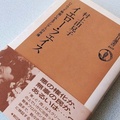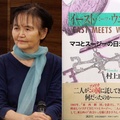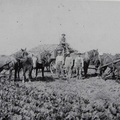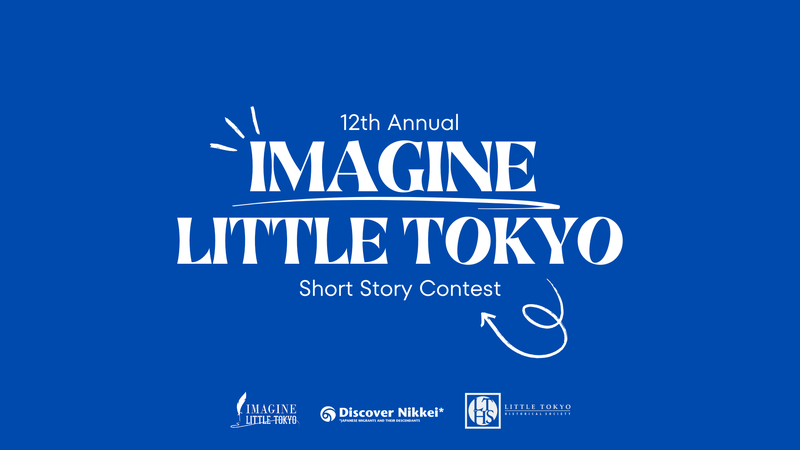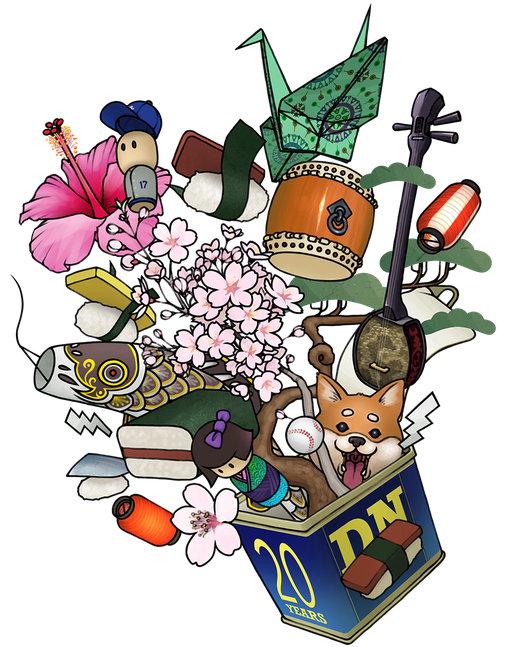Morikami Sukeji, who came to America as a member of the Yamato Colony in South Florida and stayed there alone until the end of his life after the colony was disbanded, continues to write letters to his sister-in-law and her family, who lost her husband (Sukeji's younger brother) after the war. His recollections go back further and further in time, as he recalls and relays stories told to him by his grandfather, who was a courier for the Miyazu Domain when he was a child. Meanwhile, Florida is rapidly developing, with more and more people visiting, and housing developments in the surrounding areas are booming. As a nature lover, he wanted to move to a more rural area.
* * * * *
"My grandfather was a courier."
January 1, 1973
My sister-in-law, Rei-san, is very busy right now because it's the holiday season. I received letters and greeting cards from you, so I would like to send you something in return, but most of the things here are already in Japan and are cheap. I can't send you fruit, and I don't need sewing books or magazines anymore.
The other day I was surprised to see a Japanese women's magazine for the first time in a while. Everything was better than here. It was a little cold today. It's supposed to be cold this month. There was no ozōni on New Year's Day. Filled with various delicacies, I spent the whole day lying down.
The shortness of breath that had worried me for a while has almost completely gone away, but now my feet are swollen and I can't even put on my shoes. At night, the pain throbs. My feet remind me of my grandfather, who suffered from beriberi in the winter. His legs became so swollen that they glistened. When I pressed them with my finger, a gaping hole appeared.
At night, we would lie down by the fireplace and I would be the one to give the massage. I didn't get paid anything, but he would tell me some fascinating old tales. The old man was a good storyteller and would tell me fascinating tales of the Fifty-three Stations of the Tokaido. He told me about being attacked by a pack of wolves at Hakone Pass, and getting into a fight with Kumosuke at the ferry across the Oi River. He would get lost on a dark road and climb Mount Akiha in Enshu. No matter how many times I hear his stories, they're still so interesting that I would endure my sleepiness and get the massage. He also climbed Mount Fuji twice. Apparently, from the eighth station onwards it got steeper and the sand was always slippery.
When my grandfather was young, he worked as a courier for the Miyazu Domain, and constantly traveled back and forth between Kyoto and Edo. He was apparently a very handsome man, tall with a high nose and fair skin. My grandmother was small and kind. I liked her more than anyone else. When I was a child, I loved to draw, so the souvenirs I would bring back from town were not cheap sweets, but paper, books, and red and blue ink.
It's a little cold today. It seems it's going to get cold. Yesterday, I went shopping in town. I was worried about driving, so I asked my neighbor to drive me. There were a lot of people out. Houses are being built one after another, and in five or ten years, the place where I'm living now may become the center of the city.
I received a beautiful greeting card and book from my nephew Mikio. I'm reading it carefully for the first time in a while. That's all for today. I'll write again later.
(P.S.)
I am very interested in "mysterious flying saucers." If you have the magazine please send me a copy.
Please send me "The Ancestors of the Japanese" (by Saito Tadashi, published by Kodansha). If you haven't read it yet, you can read it after you've finished. If they don't have it in the store, I don't mind an old one. Also, if you have a set of paintings of the Fifty-Three Stations of the Tokaido (cards with English translations), please send me a set. I have two or three of them, and I love them.
"More and more houses are being built."
January 1, 1973
Rei-san, I sent the import permit on December 23rd. It's been almost a month, but I haven't heard anything or received any seeds. I'm wondering what's going on.
It's gotten much cooler. The area is packed with people from the north who are escaping the cold, with about 1.75 million people visiting last year. This year, the number is expected to exceed 3 million.
Houses are being built one after another. 1,000 houses have already been built near my farm, but by the end of this year, there will be more than 3,000. At this rate, it will be the center of the city in five or ten years. I want to sell it and move to the quiet countryside. Yesterday, I went to town for the first time in a while.
A friend came from near Canada. He brought apples as a gift, and fortunately the two puppies were very happy. The pine tree I planted in my yard in memory of my late fiancée, Alice, has grown by more than three feet.
Today, I received a New Year's card from Akiko and her friends. They said they were busy and didn't have time to write. My mood hasn't changed much. My legs swell up when it's cold, which is a problem. My appetite is great. I had a good New Year's after a long time. Please be careful because the flu is going around here and there.
"I don't live a miserable life"
January 22, 1973

Thank you for your letter, Rei-san. The seeds haven't set yet. It seems to be taking a little longer, but it will take a little longer than the letter. I don't live a miserable life like you imagine. I just live in a nice house and drive a beautiful car. I eat anything, but I don't force myself to eat things I don't like just because they are nutritious.
There were days when I had no appetite and I would just eat rice with tea, and other days I would gobble down a whole dollar and a half a pound of meat. I didn't have a set time to eat. I ate when I was hungry. Sometimes I ate three times a day, sometimes six times. It all depended on how hungry my stomach was.
Being unable to stand is an incurable disease, so I don't see a doctor or take medicine. I'm letting nature take its course. I'm lonely, but I'm satisfied with the current situation. I received a New Year's card from Mr. XX. I was busy and didn't have time to write, so I thought he wouldn't come, so it was a bit surprising.
In the countryside around Tanba, especially in Yamaya, farmers have a lot of persimmons, and they make a lot of hanging persimmons and skewered persimmons for their own use. When I was a child, I looked forward to visiting relatives in the countryside more than anything. I have about 80 trees planted in my farm. If I can get a lot of fruit in the next year or two, I would like to make a lot of hanging persimmons.
It's a paradise here, neither too hot nor too cold. Last year, 1.75 million people came to escape the winter, but this year, the number is expected to reach 3 million. Houses are being built one after another, and in the last three months, nearly 1,000 have been built nearby. It is said that at least 3,000 to 4,000 houses will be built by the end of this year. A fine two-bedroom house can be purchased for around 15,000 dollars. In comparison, Japan is too expensive.
"The towns and highways are crowded with cars."
February 4, 1973
Rei-san, it's been a while. How are you? Rei-san, I sent the five magazines I promised you today by parcel post. It's not airmail so it will take about a month to arrive. I wonder if you like it? If you like it, I'll send you the next one. They are published four times a year, according to the season.
It's cold here. It's almost 1:30 in the morning, but it's pretty cold. The forecast says that something much worse than the last one will come in the next two or three days. The crops that are half dead now may be completely destroyed. I don't know if I should take this opportunity to stop, or if I should start over from scratch. I can't win against natural disasters. I have no choice but to give up.
Rei, how about fresh flowers? They are very popular among women in America, and here too, the wife of Mr. Mihori is a teacher and the business is growing more and more. Mr. Mihori is the person you met when he visited Japan with his employer, Mr. Grimes, a few years ago.
My wife is a former Kabuki dancer, tall, with bright eyes, and is quite beautiful. I sent her this clipping and the magazine because this article was in the newspaper recently. As I said before, I hardly read Japanese magazines or newspapers.
I even started to dislike reading, which I used to love so much. It seems that my interest has faded. In the past, there were many books I wanted to read, but now there are so few that I have forgotten the names and can't even order them. I'll try to find some old magazines one of these days... Japanese people are the world's biggest readers, and they have the most newspapers and magazines. I'm sure you guys read a lot of different things too. I asked Akiko about the Miyazu newspapers.
Rei-san, do you remember Jimmy Ann Tuft? He's the GI you met. He came with his father two years ago. I've never met such a fine young man. He went to college and I haven't seen him since. It's not far from here. I'll visit him next time I go to Miami.
I've started to hate going out recently. It's partly because of my bad legs, but the highways, let alone the city, are so dangerous with cars and people flooding in, it's a real risk to your life. Can you drive a car? Akiko should be able to. I have a photo.
"My current fortune came from land."
February 1973
Rei-san, I will send you the records and magazines you requested as soon as I find them. I have asked a few friends. My tastes have changed a lot in the past year. I haven't seen a movie that I loved so much for almost ten years. I'm tired of TV and radio. I read a few magazines and books, but nothing beats sleeping. I lie down and daydream. I often dream. When I was young, I lived and worked in a hut. I was full of hope and was happy.
You are under 40, still young. There are 47 years until my age. There are 60 years until I reach 100, which is a long time. What was I doing when I was about 40, when I could work boldly? I was in the depths of failure and struggling to make ends meet.
I went from a wealthy family of 250,000 dollars that I had built up over 20 years, to having nothing. But I was neither optimistic nor pessimistic. I worked hard again. Just when I had some financial leeway, I fell seriously ill. I narrowly escaped death, but my bad luck continued. (Note: This is a play on the proverb "surviving a near-death experience").
When the war ended, I was in trouble. I was a tenant farmer on someone else's land. Fortunately, I made a little profit, so I bought some land. I was able to buy land later. I bought and sold a lot, and at one point I owned land near Ichiei-cho, and I was struggling to even pay the taxes on it. The value of land gradually rose, so I stopped buying and sold some.
The assets I have now come from the land, not from farming. I donated some to the state, and some to friends. I have 150 acres left over. Now, with the land boom, I have no trouble making a living. One acre is about 4 tanbo in Japan.
(Titles omitted)
Continued >>
© 2020 Ryusuke Kawai




